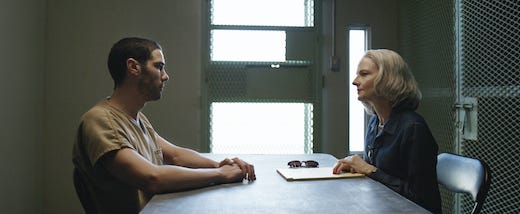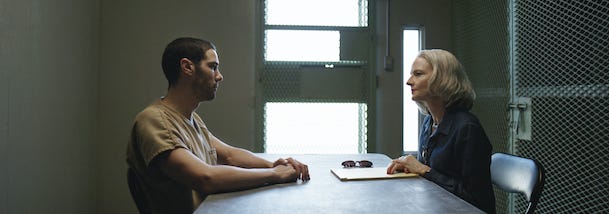ReelBob: ‘The Mauritanian’ ★★★
A true story about an innocent man caught up in the government's zeal for results rather than justice or the truth.
By Bob Bloom
“The Mauritanian” is a movie that stirs passions and reopens wounds.
The movie is based on the book “Guantánamo Diary,” by Mohamedou Ould Slahi, who was detained and imprisoned for nearly 15 years at Guantánamo without ever being charged by the United States government.
Slahi, on the word of others involved in the horrific events of 9/11, was suspected of being the recruiter for those who flew the airplanes into the Twin Towers and the Pentagon.
That he was not involved in the deadly plot did not seem to concern the government, which only wanted to get results and punish — even if they were innocent people.
It turns out a confession given by Slahi was acquired through the euphemistic techniques of “enhanced interrogation,” meaning he was tortured — subject to waterboarding, sleep deprivation and physical, mental and emotional abuse.
I realize those who lost family and friends on Sept. 11, 2001, may find the movie upsetting, believing our government did what was necessary to hunt down the perpetrators of that deadly day and bring them to justice — by any means.
And, if a few innocent people were swept up, well — as the adage goes — you can’t make an omelet without breaking some eggs.
Except that Slahi is not an egg; he is a man swept up in cataclysmic events of which he purportedly knows nothing.
“The Mauritanian” centers on the efforts of Slahi’s lawyers, Nancy Hollander (Jodie Foster) and Theresa “Teri” Duncan (Shailene Woodley), to get their client justice.
Benedict Cumberbatch plays Marine Col. Stuart Couch, assigned to prosecute Slahi and, if successful, “stick a needle in his arm.”
The film follows two trajectories — Slahi’s harrowing ordeals at Gitmo and, second, the frustrating work of his lawyers to get to the truth of his situation and overcome the roadblocks placed in their path by the government.
The performance of Tahar Rahim as Slahi makes the first path more emotionally accessible. Even if you suspect Slahi is guilty, you still can be angered by the inhumane treatment he receives at the behest of government officials who are more interested in closure than the truth.
And Rahim embodies the confusion, pain, humiliation and terror his character receives. Rahim shows how a man — even an innocent one with a strong faith — can be pushed to break emotionally and admit to acts he did not do.
The work of Hollander, Duncan and Couch is more detached. Only as they approach the same conclusions from opposite directions do you sense some moral ire swelling within them.
Foster gives a very solid performance. At first, her Hollander is more interested in defending the Constitution than Slahi. He is more a pawn to her ultimate objective. But as she uncovers the truth about the government’s actions at Gitmo, she warms toward her client, seeing him as a victim of abuse and overreach.
Woodley’s Duncan is more an idealist who is more interested in Slahi’s plight than a constitutional court case.
Cumberbatch’s transformation — from gung-ho soldier ready and willing to execute Slahi to a man of conscience who places justice above political expediency — is gradual but telling.
The movie’s ending is a foregone conclusion since it is based on a true story. And, like most movies based on fact, you don’t know where the truth ends, and fiction begins.
Still, “The Mauritanian” is a solid endeavor that, at 129 minutes, could have used a bit of trimming, but otherwise is a compelling story of a government run amok.
I am a founding member of the Indiana Film Journalists Association. I review movies, Blu-rays and DVDs for ReelBob (ReelBob.com), The Film Yap and other print and online publications. I can be reached by email at bobbloomjc@gmail.com. You also can follow me on Twitter @ReelBobBloom and on Facebook pages —ReelBob and the Indiana Film Journalists Association. My movie reviews also can be found at Rotten Tomatoes: www.rottentomatoes.com.
THE MAURITANIAN
3 stars out of 4
(R), sexual assault, violence, language




